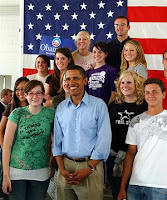 10- “By linking political issues to the extraneous concerns for race, glamour, religion, or experience, and avoiding central questions of power and purpose in society, the real intellectual and ideological questions of the social order have been wholly obscured and the mass capacity to respond
10- “By linking political issues to the extraneous concerns for race, glamour, religion, or experience, and avoiding central questions of power and purpose in society, the real intellectual and ideological questions of the social order have been wholly obscured and the mass capacity to respondTo an extent, I view this as scapegoating. We are focusing all our attention on others, making it the focus of our problems. Like pop-culture, because dealing with that is something we can actually handle. It's seeing someone else's life and it makes us feel better about our own in some cases.

9- “’Brand Obama’s’ pure media-created celebrity-hood has been amajor factor in his ascendance, particularly with regard to younger voters” (Streets,169). It’s true, but it’s also fair. You have to appeal toyour audience on their media platform, and Obama did just that.
He communicated in a way and reached the youth in a way that was understandable to the best of our abilities. He is a flawless speaker, and utilized numerous media platforms to reach is target audience. This appealed to the Limbic brain, because he instilled an emotional transfer in his speeches, also the Neocortex because he was saying things that had such a deep meaning to them. Photo Credit.

8- “Obama has nonetheless benefited from being mentally hyper-competent in the wake of the often highly incompetent Bust administrations ‘region of error’” (Streets, 170). American’s needed someone to trust, and someone who wouldn’t run them further into the ground then we already were. Bush left a big mess to clean up, it was just a matter of whose hands it actually fell into. Photo Credit.
With this election, I feel people were more involved, because of the hole that Bush left, it was like this election suddenly had everyones attention. Or maybe it was the place I was at in my life, being among students voting for the first time. However, I feel this is an example of the personal shift. It went from this feeling of "my one vote doesn't matter" to "I have to vote, my voice has to be in this."

7- “A candidate also has no chance for the White House is he or she does not gain approval from the powerful people who own and manage national and global corporate media” (Streets, 189). This is so true, and so sad. It's prime example of the political shift. We always have to have someone with the money bags approving everything that we do or try to do. Photo Credit.
It's a terrible realization and something that I truly detest about our country. As I am aware that Obama did take big hand outs from companies for his campaign, I respect him for trying to raise it by donations from everyday plain folks.

6- “We who protest the war are not politicians. We are citizens” (Streets, 193). I love this sentence, it goes to show that we know what we want, but we can’t trust the politicians to fight for it. When I think of this, I think of plain folks, because this is what the phrase appeals to, those of us that want to make a difference but are seen to low on the scale to make any real type of difference. I believe that a lot of poeple looked up to Obama as speaking for the small person, and I think a lot of those people are incredibly let down by the way his presidency has gone. Photo Credit.












